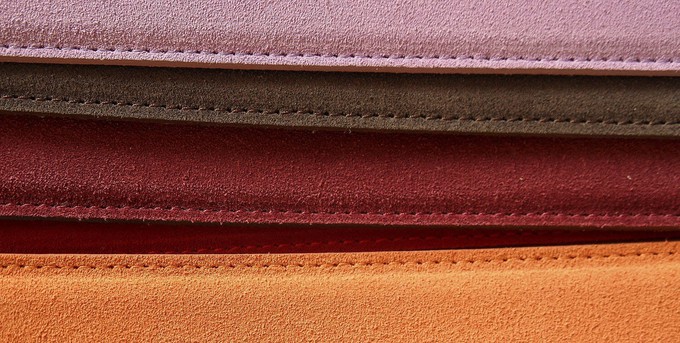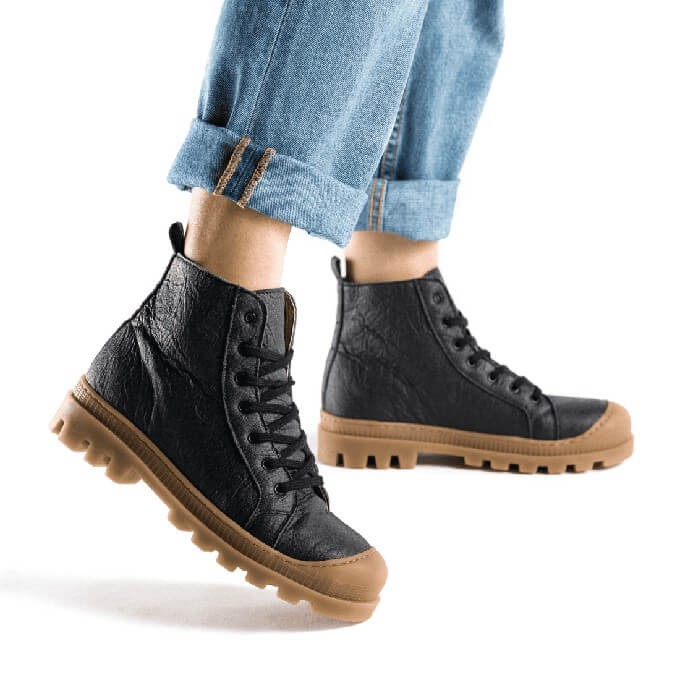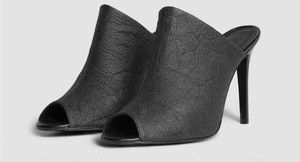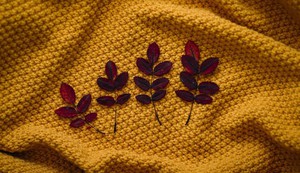- Clothes
- Bags
- Accessories
-
Inspiration
- Shoes
Leather vs Vegan Leather: What’s ACTUALLY More Sustainable?

With ethical fashion, things aren’t always black and white. So, no: the real leather vs vegan leather debate isn’t as simple as “leather = bad, vegan leather good”.
Here’s an objective, jargon-free comparison to help you make an informed decision.
Real leather and sustainability
Leather comes from the tanning of animal skins and hides, from cattle to sheep and even aquatic animals like alligators.
Eco-friendly pros of real leather
- Most leather is a by-product of the meat industry, so it actually reduces waste. If the leftover hides were sent to landfills, this would generate higher carbon emissions
- Naturally biodegradable
- Durable: when cared for, real leather can last you for decades (again, less waste)
Sustainability cons of real leather
- It relies on livestock: this is the world’s largest user of agricultural resources and lands and one of the main causes of deforestation, which leads to biodiversity loss and further contributes to climate change
- Leather tanning and dyeing are chemical-heavy processes: this is bad for the environment (especially when these chemicals pollute water resources), workers, and the wearers themselves, in some cases. Vegetable tanning is a more sustainable option but, sadly, not widely used
- Not all leather is a by-product! Plus, it actively contributes to 10% of the animal’s total value
- This reinforces the main ethical problem behind leather: that animals have to die for it, whether more or less directly
Vegan leather and sustainability
Also known as faux leather or, in some cases, pleather (plastic leather), vegan leather is usually made from polyvinyl chloride (PVC) or polyurethane (PU).
Eco-friendly pros of vegan leather
- No livestock involved: the main advantage of vegan leather vs real leather is that the former doesn’t contribute to the excessive use of agricultural lands, deforestation, and animal deaths
- It has lower carbon emissions: 15.8 kg per square metre of vegan leather vs 17.0 for leather
- In some cases, it involves recycled plastic or bypasses this material altogether. In fact, some vegan leather is made from natural options like pineapple leaves, apple peels, or cork
Sustainability cons of vegan leather
- Its production also tends to be chemical-heavy. PVC, in particular, is extremely polluting and releases hazardous dioxins. PU is the lesser of the two evils, but still derived from fossil fuels
- Not biodegradable or, with natural options, only partly. Because vegan leather releases phthalates and toxic particles when decomposing, it can affect the environment and even the health of animals
- It tends to be less durable than real leather, so it leads to additional waste when you replace it
Real leather vs vegan leather: so, is vegan leather better for the environment?
Vegan leather isn’t automatically better for the environment. Our honest answer is… it depends!
For example, the environmental impact of purchasing one real leather piece tends to be lower than that of replacing faux leather products every few years.
So, the answer to the leather vs vegan leather debate really depends on how that item was produced, how you use it, and what matters the most to you personally.
From a sustainability point of view:
- consider sticking to the most eco-friendly real leather that’ll last you for many years. This should be an actual by-product and, if possible, made with vegetable tanning rather than chemicals
- as for vegan leather, choose PU over PVC or, even better, natural options
From an ethical standpoint, however, vegan leather is a more logical choice than real leather. It’s also suitable for vegetarians and vegans.
You can browse both real leather and vegan leather items from different fairtrade brands on Project Cece. And, if you’ve found this comparison helpful, start receiving our tips and inspiration to make more ethical fashion choices.
Share our story
Related articles
Best Vegan Shoes: 6 Cruelty-Free Brands from Trainers to Heels
No need to step away from your ethos when accessorising your outfits! Discover the best vegan shoes for your style and preferences, all in one place.
Piñatex: All the Juicy Properties of Pineapple Leather
First time hearing about pineapple leather? We were surprised, too! Discover whether or not Piñatex can be considered a sustainable type of vegan leather.
What Are the Most Sustainable Fabrics? Oh, Sew Eco-Friendly!
‘Natural’ doesn’t always = ‘eco-friendly’! So, here’s a simple list of the most sustainable fabrics, why they’re good for the planet, and how to find them.
Project Cece is a platform that collects ethical fashion from vetted brands and shops in one place. Browse ethical fashion for women and men and find items that fit your style, budget and values!





